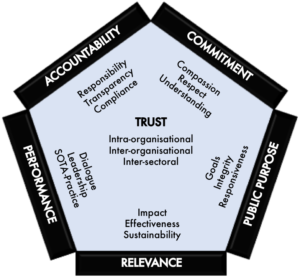Philanthropy.Insight Assessement Tool (PIAT)
COMMITMENT
Understanding
- To which extent is the organization oriented exclusively towards the well-being of beneficiaries and partners?
- How is the voice of the beneficiaries taken into account?
- In which way is the organization conscious of its mission as civil society actor?
Compassion
- To which extent is the organization imbued by a spirit of compassion?
- How does compassion permeate to programs, projects and action?
- How is made sure that compassion consistently takes precedence over other goals the organization may pursue?
Respect
- To which extent does a spirit of respect for each and every human being pertain to all activities of the organization?
- How is made sure that all actions are taken in an atmosphere of sincerity and respect for the dignity and priorities of every beneficiary?
- To which extent is the organization respectful of cultural diversity?
PUBLIC PURPOSE
Goals
- To which extent are the statuary goals of the organization in accordance with public benefit goals?
- How does the organization maintain sufficient independence from purposes proclaimed by the state and/or the business sector?
- In which way does the organization make amends for conflicts of acceptance?
Integrity
- How does the organization steer clear of money-laundering and tax evasion?
- In which way do the statutes of the organization provide for safeguards against corruption and other unlawful activities?
- To which extent does the organization adopt a culture of fairness and integrity?
Responsiveness
- How are institutions, programs, projects and actions based on real need?
- In which way are partners, beneficiaries, and experts involved in decision-making processes?
- To which extent is the organization flexible in responding to changes?
RELEVANCE
Impact
- In what way is a methodology in place to ensure a short- and medium-term non-partisan evaluation of all projects?
- To which extent is a discussion process in place to ensure beneficiaries’ participation in evaluating projects?
- How are failures and mistakes sufficiently and publicly acknowledged?
Effectiveness
- By what means are methods in place to monitor the outcome of methods and projects?
- How do programs and projects contain mechanisms of adjustment to changing circumstances?
- To which extent is the organization sufficiently experimental, and by what mode does it failure to promote its effectiveness?
Sustainability
- To which extent to programs and projects conform to UN SDGs?
- How are programs and projects devised and pursued to contribute to social change?
- In what way are grant programs executed with sufficient scope and duration to ensure partner’s sustainable organizational development?
PERFORMANCE
Dialogue
- To which extent does the organization operate on a level playing field with partners and beneficiaries
- By what mode does the organization provide for short-, medium- and long- term relationships as seems beneficial in pursuing its goals?
- How are partners and beneficiaries sufficiently involved in developing strategies, programs, and projects?
Leadership
- To which extent re members of board(s) and staff chosen on the basis of their commitment, leadership abilities, know-how and trustworthiness?
- In what way does the governance system ensure that decisions are made responsibly and in accordance with the organization’s statutes and mission?
- How does the organization pay attention to the specific abilities, needs, and limitations of donors and volunteers?
State-of-the-Art Practice
- By what mode are strategic goals defined, pursued and evaluated?
- To which extent are specific civil society management kills trained and applied?
- In what way is the management of the organization committed to the organization’s strategic goals?
ACCOUNTABILITY
Responsibility
- In what way does the organization actively interact with the public?
- How is made sure that online resources and publications meet accepted reporting standards?
- By what means does the organizations prepare to react to comments, criticism, question, demands, and applications?
Transparency
- How is made sure that methods of accounting conform to state-of-the-art standards?
- To which extent do periodical reports provide sufficient information on the purpose, methodology, practice, and outcome of all operations?
- In which way does the organization meet requirements by law or by choice to make reports and accounts publicly available?
Compliance
- To which extent does the organization regard itself as a civil society organization and comply with standard civil society rules and procedures?
- How does the organization abide by the law in pursuing its aims, and in reporting, and publicizing?
- By what mode does the organization defend its own and general civil society principles in the face of interference, harassment, and pressure?








